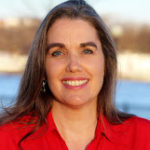I’ve been thinking about weekly worship services I used to lead at a state psychiatric hospital. These were 45-minute weekly, ecumenical services that took place early Sunday afternoons. Each service included songs, sometimes hymns, but more often contemporary praise songs, and all the usual parts of liturgy including communion. I have some vivid memories from those times of worship.
During one service, we had just completed the Prayer of Confession and Words of Assurance and a man asked out loud, “Do you really mean it? I am forgiven by God?” I answered without hesitation that he was, indeed, forgiven. He went on to say that he had murdered someone (while in the midst of an episode of psychosis) and that he couldn’t possibly be forgiven for that. I, again, assured him that God forgives him and the service continued.
In the days following the service, he and I had a few conversations around forgiveness. It turns out that he believed his illness was God’s punishment for something he had done as a child. So whatever he did while experiencing symptoms was then unforgivable. We talked about the love God has for us and how God would not use something so horrible as psychosis to punish anyone. That just isn’t how it works. In addition, he wasn’t in control of himself when he killed someone. There are consequences for that, of course, but being unforgiveable isn’t one of them. God forgives what human legal systems cannot.
This man later told a colleague that hearing the Words of Assurance each week in worship helped him believe that God might forgive him too. He wasn’t quite there, yet, but he thought if he heard the words, “In Christ we are forgiven…” often enough, he just might believe it.
A similar memory I have of those worship services is the day I realized the power of God’s presence and forgiveness in the sacrament of communion. During a particular service, I looked up and realized that more than half the people in attendance were people who had committed heinous crimes while experiencing the symptoms of their illnesses. Some of the people I had come to know and had a lot of hope for their recovery. Others were very challenging people and would remain so even as their symptoms abated. When I said, “All are welcome at this table” it struck me that God didn’t distinguish among those present. I offered each patient the elements of communion and said, “This is the body broken for you. This is the cup poured out for you.” I knew that the words were true. Each person who came forward to receive communion was loved by God, without condition. Each person received the same forgiveness and grace. There are no limits to God’s love and forgiveness.
These experiences at the hospital have been on my mind lately because several people have shared with me feelings of somehow being outside of God’s forgiveness. It’s often about perception. We feel we are unforgiveable, unworthy, or unlovable and find it hard to believe that God could see us differently. We somehow believe that such a gift has to be earned. I wish there was something I could say or do to convince everyone that there is nothing that can truly separate us from God’s love. Whatever it is we think we’ve done that God cannot forgive, or whatever we are struggling with that we think of as a punishment from God, we’ve interpreted something wrong. Imagine how different the world would be if all of us knew that we are forgiven and loved exactly as we are – no conditions, no limits, just Love.
In Christ we are forgiven. Thanks be to God.

Rev. Dr. Rachael Keefe
Rev. Dr. Rachael Keefe is an author, and the pastor of Living Table United Church of Christ in Minneapolis, MN. You can find links to her blog, video series, and books at Beachtheology.com
